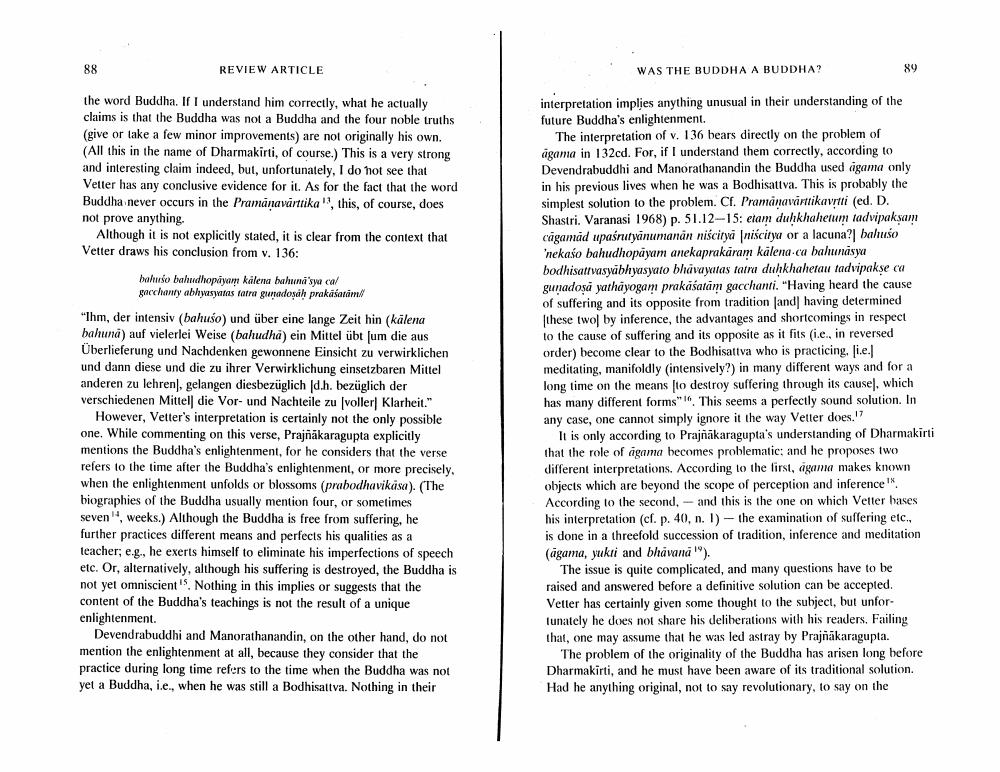Book Title: was The Buddha A Buddha Author(s): Eli Franco Publisher: Eli Franco View full book textPage 5
________________ 88 REVIEW ARTICLE WAS THE BUDDHA A BUDDHA? 89 the word Buddha. If I understand him correctly, what he actually claims is that the Buddha was not a Buddha and the four noble truths (give or take a few minor improvements) are not originally his own. (All this in the name of Dharmakirti, of course.) This is a very strong and interesting claim indeed, but, unfortunately, I do not see that Vetter has any conclusive evidence for it. As for the fact that the word Buddha never occurs in the Pramanavārttika", this, of course, does not prove anything. Although it is not explicitly stated, it is clear from the context that Vetter draws his conclusion from v. 136: bahuso bahudhopayam kalena bahuni'sya ca/ gacchanty abhyasyrafas fatra guradoşah prakasarām "Ihm, der intensiv (bahušo) und über eine lange Zeit hin (kälena bahuna) auf vielerlei Weise (bahudha) ein Mittel übt sum die aus Überlieferung und Nachdenken gewonnene Einsicht zu verwirklichen und dann diese und die zu ihrer Verwirklichung einsetzbaren Mittel anderen zu lehren), gelangen diesbezüglich (d.h. bezüglich der verschiedenen Mittell die Vor- und Nachteile zu (voller Klarheit." However, Vetter's interpretation is certainly not the only possible one. While commenting on this verse, Prajnakaragupta explicitly mentions the Buddha's enlightenment, for he considers that the verse refers to the time after the Buddha's enlightenment, or more precisely, when the enlightenment unfolds or blossoms (prubodhavikusa). (The biographies of the Buddha usually mention four, or sometimes seven", weeks.) Although the Buddha is free from suffering, he further practices different means and perfects his qualities as a teacher, e.g., he exerts himself to eliminate his imperfections of speech etc. Or, alternatively, although his suffering is destroyed, the Buddha is not yet omniscient". Nothing in this implies or suggests that the content of the Buddha's teachings is not the result of a unique enlightenment. Devendrabuddhi and Manorathanandin, on the other hand, do not mention the enlightenment at all, because they consider that the practice during long time refers to the time when the Buddha was not yel a Buddha, i.e., when he was still a Bodhisattva. Nothing in their interpretation implies anything unusual in their understanding of the future Buddha's enlightenment. The interpretation of v. 136 bears directly on the problem of agama in 132cd. For, if I understand them correctly, according to Devendrabuddhi and Manorathanandin the Buddha used game only in his previous lives when he was a Bodhisattva. This is probably the simplest solution to the problem. Cl. Pramanavirttikavii (ed. D. Shastri. Varanasi 1968) p. 51.12-15: etam dulkhahetun tad vipakşam cāgamad upaśrutyanumanăn niściya niścitya or a lacuna? bahušo 'nekaso bahudhopāyam anekaprakāram kālena ca bahunāsya bodhisattvasyabhyasyato bhavaitas fatru duhkhahetau tadvipakse ca gunadosa yathayogam prakaśatām gacchanti. "Having heard the cause of suffering and its opposite from tradition and having determined these two by inference, the advantages and shortcomings in respect to the cause of suffering and its opposite as it fits i.e., in reversed order) become clear to the Bodhisattva who is practicing, i.e. meditating, manifoldly (intensively?) in many different ways and for a long time on the means to destroy suffering through its causel, which has many different forms" "". This seems a perfectly sound solution. In any case, one cannot simply ignore it the way Vetter does.!? It is only according to Prajñākaragupta's understanding of Dharmakirti that the role of agama becomes problematic: and he proposes two different interpretations. According to the first, again makes known objects which are beyond the scope of perception and inference" According to the second. -- and this is the one on which Vetter bases his interpretation (cf. p. 40, n. 1) - the examination of suffering etc., is done in a threefold succession of tradition, inference and meditation (āgama, yukti and bhāvana"). The issue is quite complicated, and many questions have to be raised and answered before a definitive solution can be accepted. Vetter has certainly given some thought to the subject, but unforTunately he does not share his deliberations with his readers. Failing that, one may assume that he was led astray by Prajñākaragupta. The problem of the originality of the Buddha has arisen long before Dharmakirti, and he must have been aware of its traditional solution. Had he anything original, not to say revolutionary, to say on thePage Navigation
1 ... 3 4 5 6 7 8 9 10
